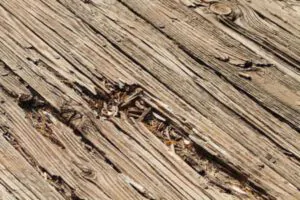Your deck is not indestructible, and like other materials, it is subject to rotting. If you find yourself in this situation, then it’s best to take care of the problem as soon as possible. Older decks will begin to show signs of rot. As older decks begin to show signs of rot, you’ll start to notice things, such as discoloration of the wood, or squishiness when stepped on.
In some situations, pressure-treated decks may still rot and decay. Microorganisms eat the cellulose which causes the wood to be brittle. This will then attract wood-eating termites that doubles the problem. Below are the factors that give rise to the rotting of your deck:
How Weather Conditions Impact Deck Maintenance and Longevity
The New England area has weather that goes from one extreme to the other –
incredibly cold winters to extremely hot summers. When it’s cold, your deck contracts. Then it expands when the weather gets warm again. This harsh cycle can weaken your deck’s structure and coating. In addition, melted snow gets into these cracks, creating rot in your decks.
Termites
These pests eat the wood of your deck from the inside out. This means you may
not realize you have a problem until it’s too late. Termites also contribute to your deck rotting.
Unfortunately, there isn’t any immediate solution to making your deck termite-proof, which makes it more challenging to protect your deck from these tiny creatures.
Stagnant Water
Having holes in your deck can cause moisture to puddle in these spots. If liquid stays in these holes for too long, chances are rot will begin to occur.
Untreated wood
Leaving your damaged deck untreated makes it more vulnerable and unprotected to the effects of weather. Cold weather will leave your deck soaked for a longer time, and these build excessive moisture. Combined together with the sun’s radiation which multiplies the rot to your deck even faster.
Debris between boards
Failing to remove debris from your deck’s boards influences fungi and bacteria growth.

Should You Repair or Replace a Deck?
You should replace rotted boards to restore their strength and structural stability. Repainting your deck also restores the appearance and color. This method is usually the more affordable option rather than replacing the deck itself.
If the rotting has extended to your railings and floorboards, and affects the rafters and joists that give your deck the strength, then it’s about time to finally replace your deck.
Replacing the deck with updated PVC, composite, metal, and other materials will prevent you from having rot problems. You will be surprised at the minimal maintenance needed when you use these materials instead. They will need nothing more than regular power washing to keep them clean. These materials are also less expensive and are easier to assemble. In comparison, wood decks will need painting, sealing, regular sanding, and other expensive repairs.
Deck Rot Repair
If you see dry rot on your deck, those areas must be replaced and removed as soon as possible. Replacing and removing these rotted areas will prevent the decay from spreading further. It is essential to be thorough in your maintenance and inspection when replacing rotten deck boards. Inspect areas that are parallel to the rotten area to prevent them from eventually contaminating your recent repairs.
Why Choose Ludlow Deck Builder? Ludlow Deck Builders | Call Us At 203-904-2564 Today!
We are not only committed and passionate in the work that we do, but we want to help keep
your deck safe and looking its best. Regardless of the size of your project, the materials you’d like to use, our experts at Ludlow Deck Builders are highly capable of handling all your needs.
Unsure about how you can fix the rot on your deck? Then call the professionals at Fairfield County Builders to assist you in keeping your deck healthy and safe. We know that your deck is an investment in your home’s value, as well as a great place to relax with family and friends. So call our deck experts today to learn more about how to fix the rot on your deck, or any other deck repair problems you may have.





